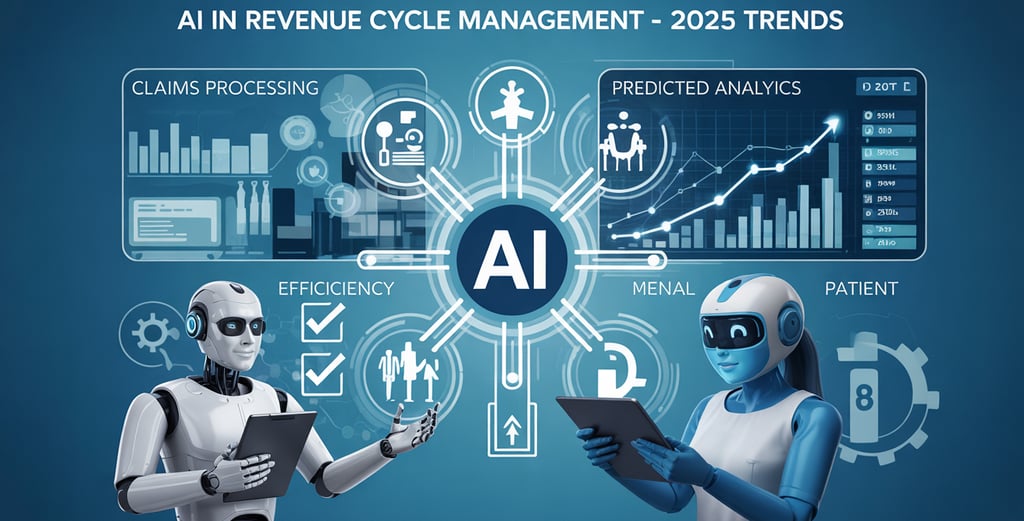AI in Revenue Cycle Management: Trends to Watch in 2025
Explore how AI is transforming revenue cycle management in 2025, enhancing billing accuracy, coding efficiency, and patient engagement in healthcare.
4/10/20253 min read


Artificial Intelligence (AI) is revolutionizing healthcare, with projections indicating that by 2025, AI applications could reduce administrative costs by 13% to 25% and medical costs by 5% to 11%, while increasing revenue by 3% to 12%."
In 2025, AI is no longer a futuristic concept but a present-day catalyst driving efficiency in Revenue Cycle Management (RCM). By automating complex processes such as billing, coding, and patient collections, AI enhances accuracy and operational efficiency. This article delves into the AI revenue cycle trends shaping healthcare in 2025, providing insights for healthcare professionals and organizations aiming to leverage AI technologies.
The Role of AI in Modern Revenue Cycle Management
RCM encompasses all administrative and clinical functions that contribute to the capture, management, and collection of patient service revenue. AI's integration into RCM is transforming these processes:
AI Integration: AI tools seamlessly integrate with existing RCM systems, enhancing functionalities like claims management and coding accuracy.
Reducing Manual Labor: Automation of repetitive tasks such as billing and claim tracking allows human resources to focus on more complex issues.
Improving Accuracy: AI minimizes human errors, leading to more accurate data handling and reduced coding and billing mistakes.
Automation of Claims Processing & Eligibility Verification
AI significantly streamlines claims processing and eligibility verification:
Real-Time Insurance Verification: AI algorithms instantly verify patient eligibility, ensuring accurate and timely claims submissions.
Automated Coding Assistance: AI analyzes clinical data to suggest precise codes, improving coding accuracy and reducing manual input errors.
Faster Claims Submission: Automation expedites the claims process, leading to quicker reimbursements and improved cash flow.
Predictive Analytics for Denial Management
AI-driven predictive analytics play a crucial role in managing and preventing claim denials:
Denial Prediction: AI models analyze historical data to forecast potential claim denials, enabling proactive measures.
Improving First-Pass Rates: By identifying and addressing potential issues before submission, AI enhances first-pass claim acceptance rates.
Reducing A/R Days: Proactive denial management leads to shorter Accounts Receivable cycles and improved financial performance.
Machine Learning in Medical Coding & Charge Capture
Machine Learning (ML) and Natural Language Processing (NLP) are revolutionizing medical coding:
NLP for Accurate Coding: AI utilizes NLP to interpret clinical notes and assign accurate CPT/ICD-10 codes, reducing errors.
Reducing Coding Errors: AI tools help prevent undercoding and overcoding, ensuring compliance and optimal reimbursement.
Charge Entry Automation: Automation of charge entry processes reduces human errors and streamlines billing operations.
AI-Driven Patient Payment & Collection Strategies
AI enhances patient financial engagement through personalized strategies:
Personalized Payment Plans: AI analyzes patient financial data to offer customized payment options, improving collection rates.
Chatbots for Financial Engagement: AI-driven chatbots handle patient inquiries and assist with payment processes, enhancing the patient experience.
Predicting Payment Behavior: AI models forecast patient payment behaviors, enabling tailored collection strategies.
Real-Time Revenue Cycle Optimization & Monitoring
AI provides real-time insights into RCM performance:
AI-Powered Dashboards: Real-time dashboards monitor key performance indicators, offering actionable insights for improvement.
Continuous Process Improvement: AI analyzes workflow data to identify bottlenecks and suggest process enhancements.
ROI Measurement: AI tools help measure the return on investment by tracking improvements in cash flow and operational efficiency.
Emerging AI Tools and Platforms in RCM
The market for AI tools in RCM is expanding, offering diverse solutions:
Top AI Vendors: Companies like Charta Health and Abridge are leading innovations in AI-driven medical coding and documentation.
EHR Integration: AI solutions integrate with Electronic Health Records (EHR), enhancing data accuracy and workflow efficiency.
Evaluating AI Tools: Healthcare organizations should assess AI tools based on factors like integration capabilities, user-friendliness, and vendor support.
Challenges and Compliance in AI-Powered RCM
Despite the benefits, AI adoption in RCM faces challenges:
Data Security and Compliance: Ensuring AI tools comply with regulations like HIPAA is crucial to protect patient information.
Ethical Considerations: Addressing potential biases in AI algorithms is essential to maintain fairness and equity in healthcare.
Building Trust: Transparent implementation and clear communication are key to gaining acceptance among healthcare providers and patients.
Conclusion
AI is transforming Revenue Cycle Management by automating processes, enhancing accuracy, and improving financial outcomes. Healthcare organizations that embrace AI technologies can achieve greater operational efficiency, reduced costs, and improved patient satisfaction. As AI continues to evolve, staying informed about emerging trends and tools will be essential for maintaining a competitive edge in the healthcare industry.
Frequently Asked Questions (FAQ)
Q1: How does AI improve the accuracy of medical coding?
AI utilizes Natural Language Processing (NLP) to analyze clinical notes and accurately assign CPT/ICD-10 codes, reducing manual coding errors and ensuring compliance.
Q2: What are the financial benefits of implementing AI in revenue cycle management?
Studies suggest that AI can reduce administrative costs by 13% to 25% and medical costs by 5% to 11%, while increasing revenue by 3% to 12%.
Q3: Are there any challenges associated with adopting AI in RCM?
Yes, challenges include ensuring data security and compliance with regulations like HIPAA, addressing ethical considerations such as algorithmic biases, and building trust among stakeholders.
Q4: How can AI help in reducing claim denials?
AI predicts potential claim denials by analyzing historical data, allowing providers to address issues before submission, thus improving first-pass acceptance rates and reducing Accounts Receivable days.
Q5: What should healthcare organizations consider when evaluating AI tools for RCM?
Organizations should assess AI tools based on integration capabilities with existing systems, user-friendliness, vendor support, and compliance with healthcare regulations.
